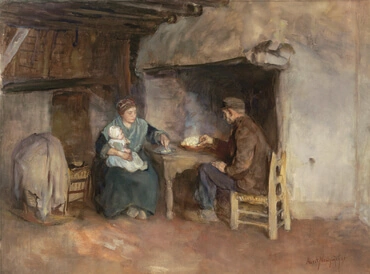1
And there is a word of Jehovah unto me, saying:
2
`Son of man, set thy face unto Gog, of the land of Magog, prince of Rosh, Meshech, and Tubal, and prophesy concerning him,
3
and thou hast said: Thus saith the Lord Jehovah: Lo, I [am] against thee, O Gog, Prince of Rosh, Meshech, and Tubal,
4
And I have turned thee back, And I have put hooks in thy jaws, And have brought thee out, and all thy force, Horses and horsemen, Clothed in perfection all of them, A numerous assembly, [with] buckler and shield, Handling swords -- all of them.
5
Persia, Cush, and Phut, with them, All of them [with] shield and helmet.
6
Gomer and all its bands, The house of Togarmah of the sides of the north, And all its bands, many peoples with thee,
7
Be prepared, yea, prepare for thee, Thou and all thine assemblies who are assembled unto thee, And thou hast been to them for a guard.
8
After many days thou art appointed, In the latter end of the years thou comest in unto a land brought back from sword, [A people] gathered out of many peoples, Upon mountains of Israel, That have been for a perpetual waste, And it from the peoples hath been brought out, And dwelt safely have all of them.
9
And thou hast gone up -- as wasting thou comest in, As a cloud to cover the land art thou, Thou and all thy bands, and many peoples with thee.
10
Thus said the Lord Jehovah: And it hath come to pass in that day, Come up do things on thy heart, And thou hast thought an evil thought,
11
And thou hast said: I go up against a land of unwalled villages, I go in to those at rest, dwelling confidently, All of them are dwelling without walls, And bar and doors they have not.
12
To take a spoil, and to take a prey, To turn back thy hand on inhabited wastes, And on a people gathered out of nations, Making cattle and substance, Dwelling on a high part of the land.
13
Sheba, and Dedan, and merchants of Tarshish, And all its young lions say to thee: To take a spoil art thou come in? To take a prey assembled thine assembly? To bear away silver and gold? To take away cattle and substance? To take a great spoil?
14
Therefore, prophesy, son of man, and thou hast said to Gog: Thus said the Lord Jehovah: In that day, in the dwelling of My people Israel safely, Dost thou not know?
15
And thou hast come in out of thy place, From the sides of the north, Thou and many peoples with thee, Riding on horses -- all of them, A great assembly, and a numerous force.
16
And thou hast come up against My people Israel, As a cloud to cover the land, In the latter end of the days it is, And I have brought thee in against My land, In order that the nations may know Me, In My being sanctified in thee before their eyes, O Gog.
17
Thus said the Lord Jehovah: Art thou he of whom I spake in former days, By the hand of My servants, prophets of Israel, Who are prophesying in those days -- years, To bring thee in against them?
18
And it hath come to pass, in that day, In the day of the coming in of Gog against the land of Israel, An affirmation of the Lord Jehovah, Come up doth My fury in My face,
19
And in My zeal, in the fire of My wrath, I have spoken: Is there not in that day a great rushing on the land of Israel?
20
And rushed from My presence have fishes of the sea, And the fowl of the heavens, And the beast of the field, And every creeping thing that is creeping on the ground, And all men who [are] on the face of the ground, And thrown down have been the mountains, And fallen have the ascents, And every wall to the earth falleth.
21
And I have called against him, to all My mountains a sword, An affirmation of the Lord Jehovah, The sword of each is against his brother.
22
And I have been judged with him, With pestilence and with blood, And an overflowing rain and hailstones, Fire and brimstone I rain on him, and on his bands, And on many peoples who [are] with him.
23
And I have magnified Myself, and sanctified Myself, And I have been known before the eyes of many nations, And they have known that I [am] Jehovah!







